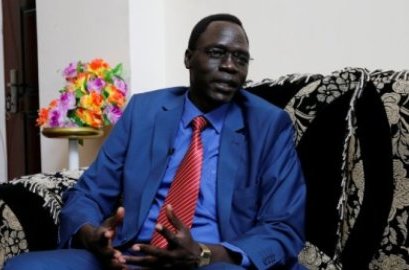South Sudanese president’s general amnesty excludes former rebel spokesperson
August 28, 2017 (JUBA) – South Sudan President Salva Kiir may have granted general amnesty to all his political opponents, their supporters and those who participated in the country’s civil war, but the pardon did not apply to rebel leader Riek Machar’s former spokesperson, James Gatdet Dak who is in jail.

“Gatdet is not covered by the general amnesty. He came to Juba under different circumstance. The case is already before the court, so the president can not intervene before the court makes a decision,” said Ateny.
“It is within the jurisdiction of the court to either convict or acquit him”, he added.
The former rebel spokesperson was kidnaped in the Kenyan capital, Nairobi in November last year and deported to Juba after Kenyan authorities approved his deportation, despite outcries and protests.
Last week, Dak appeared in a court restricted to the public and charges brought against him include; inciting violence (Article 52), treason (Article 64), disseminating false information to the detriment of South Sudanese national security (Article 75), and insulting the president (Article 76) under the South Sudanese Penal Code of 2008.
Barely a month ago, South Sudan released at least 30 political prisoners following an amnesty President Kiir had declared in May to facilitate the national dialogue initiated to reconcile warring parties.
Analysts say the move to free detainees without any precondition demonstrated Kiir’s determination to resolve the country’s civil war.
South Sudan has experienced violence since December 2013 when political disagreements between President Kiir and the country’s former First Vice-President saw the nation split along ethnic dimensions.
Tens of thousands of people have been killed and over two million displaced in the country’s worst ever violence in its post-independence period.
(ST)
